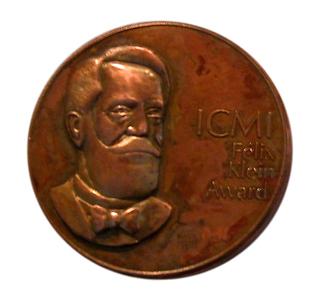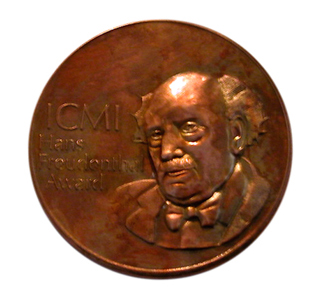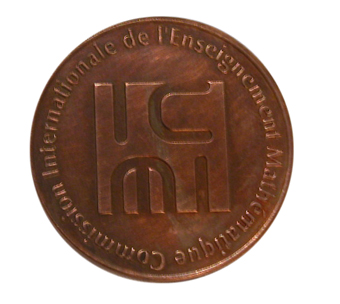
 |
THE INTERNATIONAL COMMISSION |
The International Commission on Mathematical Instruction (ICMI) has decided in 2000 to create two prizes recognizing outstanding achievement in mathematics education research:
These awards, which pay tribute to outstanding scholarship in mathematics education, serve not only to encourage the efforts of others, but also to contribute to the development, through the public recognition of exemplars, of high standards for the field. The awards consist of a medal and a certificate, and they are accompanied by a citation. They have a character similar to that of a university honorary degree and are given in each odd numbered year (starting in 2003). At each ICME congress, the medals and certificates of the awards given since the previous ICME are presented at the Opening Ceremony. Further, the awardees are invited to present special lectures at the ICME.
An Award Committee (AC) of six persons selects the awardees. Members of the AC are appointed by the President of ICMI, after consultation with the Executive Committee and with other scholars in the field. The active members of the AC, except for its chair, are not made known. Only at the time when the terms of committee members expire are their names made public. The terms of appointment of the AC members are for eight years and non-renewable, with three of the members being replaced each four years. One of the three continuing members shall then also be named as committee chair.
To initiate the process, a committee of six has been appointed in 2002, three of them with eight-year terms, the other three with four-year terms. Exceptionally, the first chair of the Award Committee has been chosen among the ICMI Executive Committee but, in the future, current members of the ICMI EC should not be selected for membership in the Award Committee.
The AC, once appointed, is completely autonomous. Its work and records are kept internal and confidential, except for the obvious process of soliciting advice and information from the professional community, which should be done by the committee chair. The committee has full authority to select the awardees. Its decision is final. Once made, that decision is to be reported, in confidence, to the ICMI-EC, via the President of ICMI.
As a tangible sign of recognition, each awardee receives a certificate and a medal. On one face of the medals are shown the past two Presidents of ICMI, Felix Klein (1849-1925) and Hans Freudenthal (1905-1990), whose names were given to the awards. On the reverse side appears the logo of ICMI, surrounded by the name of the Commission, written in French and in the form of a circle, Commission internationale de l'enseignement mathématique. This is a testimony to the intensive use of French in the early years of ICMI, as is reflected, for instance, in the issues from that period of the journal L'Enseignement Mathématique, the official organ of ICMI since its inception.

Felix Klein Medal (obverse side) | 
Hans Freudenthal Medal (obverse side) | 
Medals (reverse side) |
The ICMI award recognising lifelong achievement in mathematics education research is named after Felix Klein (1849-1925), one of the most important mathematicians of the late 19th and early 20th centuries. Klein's name is attached today to many major contributions to mathematics, especially in function theory and non-euclidean geometry. He is especially famous for his work on the connections between geometry and group theory, as expressed in the so-called Erlanger Programm (1872). Klein played a key role in having Göttingen recognised as a major research centre in mathematics and under his editorship the Mathematische Annalen became one of the most prestigious research journals in mathematics. He also directed the publication of the Enzyklopädie des Mathematischen Wissenschaften. Slightly before the turn of the century Klein became interested in the teaching of mathematics at school level. He gave summer courses for teachers in which he intended to make accessible to secondary school teachers some of the most recent mathematical developments of his time. This eventually led him to promote the idea of presenting "elementary mathematics from an advanced standpoint", to use his own expression, with the aim in particular of providing teachers with a comprehensive view of basic mathematics. In 1908 Klein was appointed, at the Fourth International Congress of Mathematicians, as President of a committee with the mandate to constitute an International Commission to organise a comparative Study on the methods and plans of mathematics teaching in secondary schools. This International Commission eventually developed a much wider scope of interest and became the ICMI as we know it today, with Klein acting as its President until 1920.
The second ICMI award is given for a major program of research on mathematics education during the past ten years and it is named after Hans Freudenthal (1905-1990). Born in Germany, Freudenthal moved in 1930 to Amsterdam, after having obtained his doctorate, where he became assistant to L.E.J. Brouwer. In 1946 he was appointed in Utrecht to a chair in pure and applied mathematics and the principles of mathematics. He made substantial contributions to topology, geometry and the theory of Lie groups, but his professional interests became gradually more centred about issues of mathematics education. He is the founder of the theoretical approach towards the learning and teaching of mathematics known as "Realistic Mathematics Education". Freudenthal launched in 1971 the IOWO, a research institute on mathematics education which, after his death, was renamed the Freudenthal Institute. Freudenthal served on the ICMI Executive Committee from 1963 to 1974, and was ICMI President from 1967 to 1970. He prompted the establishment of the ICME congresses, devoted solely to mathematics education - in contrast to mathematics education as a component inside the International Congresses of Mathematicians -, the first one having been organised at his initiative during his ICMI presidency (Lyon, France, 1969). He also launched in 1968, and for many years edited, the famous international journal Educational Studies in Mathematics, a standard reference in the field nowadays and a journal much closer to the on-going development in mathematics education research that ICMI official organ, L'Enseignement Mathématique.